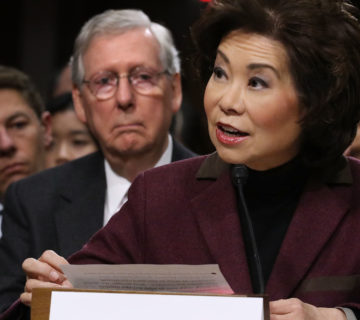WASHINGTON – Today, Restore Public Trust Director Lizzy Price released the following statement in advance of the two-year anniversary of President Trump signing his tax cut bill on December 22, 2017.
“Santa Claus exists for Big Pharma and his name is Donald Trump. It’s been two years since President Trump left a multi-billion dollar present under Big Pharma’s tree, and it’s been the gift that keeps on giving for them.
“But while Big Pharma and their CEOs are raking in the cash and throwing it at lobbyists and their allies in Congress, patients across the country are paying more and more for their prescription drugs.
“If Big Pharma had any decency this holiday season they would take the billions of dollars they got from the Trump tax cut and use it to reduce prices for patients and families instead of writing bigger campaign contributions, giving bigger bonuses to their CEOs, or piling more into buybacks for their shareholders.”
Background on the Big Pharma Tax Cut
Tax Cuts And Jobs Act Benefitted Pharmaceutical Companies And Their Shareholders Immensely
December 2017: Tax Cuts And Jobs Act Passed, Permanently Cutting Corporate Tax Rates And Making It Cheaper For Pharmaceutical Companies To Repatriate Foreign Cash
Trump And Congress Enacted The Tax Cuts And Jobs Act, A $1.5 Trillion Tax Cuts Bill That Cut Corporate Tax Rates From 35 Percent To 21 Percent. “In December 2017, President Trump and the Republican-led Congress enacted the Tax Cuts and Jobs Act, a $1.5 trillion bill that delivers massive tax cuts to the nation’s largest corporations and wealthiest families. The legislation cuts the corporate tax rate permanently from 35 percent to 21 percent, repeals the corporate alternative minimum tax, moves toward a territorial tax system that largely exempts future foreign profits from taxation, and sets a 15.5 percent repatriation rate for cash held overseas.” [Office Of Cory Booker – Pharma Tax Report – April 2018, 4/9/18]
Tax Bill Made It Cheaper For Pharmaceutical Companies With Large Overseas Cash Stockpiles To Repatriate Foreign Money. “At the biggest healthcare conference of the year, executives are happy about the new federal tax law — but not for the reason you may expect. Many biotech and pharmaceutical firm won’t gain much from the new corporate tax rate, but they’ll benefit from being able to access overseas cash. Analysts see a spike in dealmaking this year thanks to an influx of cash. […] The law encourages companies to bring overseas cash back to the U.S., a process known as repatriation. They’re required to pay a tax on that money, and pharmaceutical companies have some of the largest stockpiles of overseas cash. But the tax law President Donald Trump signed last month makes it cheaper for multinational companies to repatriate foreign cash, and they can use that money to fund transactions.” [CNBC, 1/8/18]
- Bloomberg: “U.S. Drugmakers Will Be One Of The Biggest Beneficiaries Of The Repatriation Portion Of The Bill. They’ve Been Sitting On Billions Of Dollars In Overseas Earnings And Can Now Bring Home That Cash At A Reduced Rate.” “U.S. drugmakers will be one of the biggest beneficiaries of the repatriation portion of the bill. They’ve been sitting on billions of dollars in overseas earnings and can now bring home that cash at a reduced rate. While the tax bill has been promoted by Republicans as a job creator, the reality is that drug companies are more likely to return the money to shareholders, or use it to make acquisitions.” [Bloomberg, 12/16/17]
- Celgene’s CEO Said The Changes Would Allow The Company To Access 60% Of The Cash It Could Not Previously Access. “Celgene CEO Mark Alles said the changes will allow it to access about 60 percent of the cash it couldn’t beforehand, and the one-time tax could be between $800 million and $1.3 billion. Ahead of the presentation, the biotech company announced it would buy Impact Biomedicines.” [CNBC, 1/8/18]
Pharmaceutical Companies Took In Billions From The Tax Bill, While Increasing Prices On Consumers
At The Start Of 2019, Pharmaceutical Companies Raised Prices On Consumers
CBS News HEADLINE: “Big Pharma Ushers In New Year By Raising Prices Of More Than 1,000 Drugs.” [CBS News, 1/2/19]
Examples Of Major Pharmaceutical Companies Raising Prices At The Start Of 2019:
- Allergan Started 2019 Off By Increasing Prices On Over Two Dozen Products By 10-Percent. “Pharmaceutical companies are ringing in the new year by raising the price of hundreds of drugs, with Allergan PLC setting the pace with increases of nearly 10% on more than two dozen products, according to a new analysis.” [Wall Street Journal, 1/1/19]
- Pfizer Started 2019 Off By Increasing Prices On 41 Of Its Drugs (10-Percent Of Its Product Portfolio). “The prices of some of your medicines are about to go up. Pfizer said Friday that it will be raising the prices of 41 drugs, or 10 percent of its product portfolio, in January.” [USA Today, 11/16/18]
Pharmaceutical Companies Took In Almost $7 Billion From Two Provisions Of The Tax Cuts And Jobs Act
Tax Overhaul Resulted In More Profits For Insurers, Pharmacy Benefit Managers, And Drug And Biotech Companies. “Companies have been less aggressive on the consolidation front than analysts say they had anticipated in the four months since Congress lowered corporate tax rates in a sweeping overhaul, freeing up overseas cash and reducing tax bills for pharmaceutical makers, life-sciences companies and health insurers. […] One thing is for sure, however: the tax overhaul certainly unlocked more profits for the industry. It not only lowered the domestic corporate tax rate from 35 percent to 21 percent, a huge boon to insurers and pharmacy benefit managers, but it also enticed drug and biotech companies to bring home huge overseas cash reserves by slashing taxes on those earnings, too. Pfizer, which has been mentioned as a potential buyer of Shire, announced an extra $10.7 billion in reported income for 2017 because of the tax changes. Allergan, UnitedHealth and Anthem have also recorded a benefit from the tax overhaul, according to a recent analysis by Bloomberg.” [Washington Post, 4/18/18]
Oxfam America: In 2018, Four Major Pharmaceutical Companies “Received Almost $7 Billion” From Tax Overhaul. “What’s more, Johnson & Johnson, Pfizer, Merck and Abbott Laboratories seem to have received almost $7 billion last year from two of the main provisions in the new tax code ($1.7 billion from the corporate tax rate cut and $5.3 billion from the tax break on previously untaxed offshore earnings). Pfizer topped the list with an estimated $2.8 billion in tax savings, followed by Johnson & Johnson at $2.5 billion, Merck at $1.2 billion and Abbott at $473 million.” [Oxfam America, 4/9/19]
- Axios HEADLINE: “4 Pharma Companies Saved $7 Billion From GOP Tax Law.” [Axios, 4/9/19]
Following Passage Of The Tax Cuts And Jobs Act, Pharmaceutical Companies Announced $73 Billion In Shareholder Buybacks
2017 To 2019: Pharmaceutical Companies Announced $73 Billion in Share Buybacks. “Collectively, drug companies have announced nearly $73 billion in share buybacks since the tax law passed in December 2017, according to Americans for Tax Fairness. Stock buybacks mostly enrich the already wealthy, including CEOs: the wealthiest 10% of American households own 84% of all corporate shares, the top 1% own 40%. About one-half of households own no stock.” Details can be found in the below table:
|
COMPANY |
BUYBACKS |
|
AbbVie |
$15 billion |
|
Amgen |
$10 billion |
|
Pfizer |
$10 billion |
|
Merck |
$10 billion |
|
Eli Lilly |
$8 billion |
|
Celgene |
$8 billion |
|
Johnson & Johnson |
$5 billion |
|
Biogen |
$3.5 billion |
|
Allergan |
$2 billion |
|
Vertex |
$500 million |
|
Allscripts Healthcare Solutions, Inc. |
$250 million |
|
Syneos |
$250 million |
|
Ligand Pharmaceuticals |
$200 million |
|
Emergent Biosolutions |
$50 million |
|
Avadel Pharmaceuticals |
< $7 million |
|
TOTAL |
$72.8 BILLION |
[Americans for Tax Fairness, 1/8/19]
Salon: “Stock Buybacks Only Benefit Investors, Known As Shareholders.” “Stock buybacks only benefit investors, known as shareholders, who are generally far wealthier than the average American. For example, while stock market increases have been great for many companies, only about half of Americans own any stock at all. This means that while major drug companies shower wealthy investors, they are also raising drugs prices and neglecting to put funds towards research and development.” [Salon, 2/22/18]
###



